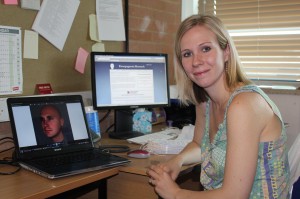 Dr Sarah Bate from the Psychology Research Centre has been awarded £63,050 from the CCCP strand of the Fusion Fund to develop a Centre for Face Processing Disorders at BU. Sarah’s work to date has explored the cognitive presentation and treatment of face processing deficits in adults and children with a range of neuropsychological conditions, such as developmental or acquired prosopagnosia (face blindness), autistic spectrum disorder, and Moebius syndrome. The initiative was launched in response to the large amount of media attention generated by Sarah’s research. After Sarah’s work was featured in The Guardian newspaper and in a BBC1 documentary last year, she has been contacted by over 700 people who believe they have prosopagnosia and would like to participate in her research. Given that most investigations into prosopagnosia to date have examined relatively small numbers of cases, Sarah now has the unique opportunity to develop large-scale academic and societal impact by having the resources to test this large patient group. Importantly, this work forms the basis of an Impact Case Study for the forthcoming REF, and the additional funds will be invaluable in the further development of the Case Study over the next year.
Dr Sarah Bate from the Psychology Research Centre has been awarded £63,050 from the CCCP strand of the Fusion Fund to develop a Centre for Face Processing Disorders at BU. Sarah’s work to date has explored the cognitive presentation and treatment of face processing deficits in adults and children with a range of neuropsychological conditions, such as developmental or acquired prosopagnosia (face blindness), autistic spectrum disorder, and Moebius syndrome. The initiative was launched in response to the large amount of media attention generated by Sarah’s research. After Sarah’s work was featured in The Guardian newspaper and in a BBC1 documentary last year, she has been contacted by over 700 people who believe they have prosopagnosia and would like to participate in her research. Given that most investigations into prosopagnosia to date have examined relatively small numbers of cases, Sarah now has the unique opportunity to develop large-scale academic and societal impact by having the resources to test this large patient group. Importantly, this work forms the basis of an Impact Case Study for the forthcoming REF, and the additional funds will be invaluable in the further development of the Case Study over the next year.
Initial funding of the new Centre was provided by HEIF money, and a postdoctoral ‘Centre Manager’ (Dr Nicola Gregory) was recently welcomed to this position. A second postdoctoral research position funded is currently being advertised. Sarah and Nicola are currently working hard to implement their plans for the first 12 months of the Centre, and are using the Fusion money to achieve the following aims:
- To carry out a large-scale cognitive assessment investigation of 100 individuals with developmental prosopagnosia, and to enrol these participants in an intervention programme.
- To co-produce this research with BU students. The Centre is providing placement/dissertation opportunities for two PhD students, three MSc students, six final year undergraduate students, and three second year undergraduate students. All students will contribute to the core research aims of the Centre, and will receive the unique opportunity to gain experience in the administration of neuropsychological tests with this population.
- To host a professional development workshop for individuals who work with children with face processing difficulties. This event is scheduled for 13th December, and the University’s Public Engagement Officer, Becca Edwards, is providing invaluable assistance to the team with the organization of this event.
- To host a Centre Open Day in July 2013, providing feedback to research participants and information to the public after face processing disorders. The team plan to integrate this event with BU’s Festival of Learning.
- To develop an existing academic network of face processing researchers, to facilitate large-scale national and international projects and placements opportunities for students.
One of Sarah’s key aims is to utilise this pump priming to sustain the project beyond the lifetime of the Fusion grant. She plans to submit bids for funding to both charities and small organizations, in addition to developing larger bids targeted at the research councils. The Centre is already off to a flying start having secured sponsorship from the Encephalitis Society, and is soon to receive media coverage in The Independent newspaper. In addition, the Centre is to be featured in a CBBC documentary that will be filmed next month.
Sarah and Nicola are currently working hard with two undergraduate research assistants and a MSc student to develop the battery of tests required for the research programme, and to develop information packs and web presence for the Centre. Watch out for the Centre’s regular updates on the Research Blog, and check out www.prosopagnosiaresearch.org for more information. You can also follow the Centre’s work on Twitter: @BUfacecentre.
 BU Centre for Face Processing Disorders featured in the Independent
BU Centre for Face Processing Disorders featured in the Independent










 Fourth INRC Symposium: From Clinical Applications to Neuro-Inspired Computation
Fourth INRC Symposium: From Clinical Applications to Neuro-Inspired Computation ESRC Festival of Social Science 2025 – Reflecting back and looking ahead to 2026
ESRC Festival of Social Science 2025 – Reflecting back and looking ahead to 2026 3C Event: Research Culture, Community & Cookies – Tuesday 13 January 10-11am
3C Event: Research Culture, Community & Cookies – Tuesday 13 January 10-11am Dr. Chloe Casey on Sky News
Dr. Chloe Casey on Sky News Final Bournemouth University publication of 2025
Final Bournemouth University publication of 2025 ECR Funding Open Call: Research Culture & Community Grant – Application Deadline Friday 12 December
ECR Funding Open Call: Research Culture & Community Grant – Application Deadline Friday 12 December MSCA Postdoctoral Fellowships 2025 Call
MSCA Postdoctoral Fellowships 2025 Call ERC Advanced Grant 2025 Webinar
ERC Advanced Grant 2025 Webinar Horizon Europe Work Programme 2025 Published
Horizon Europe Work Programme 2025 Published Update on UKRO services
Update on UKRO services European research project exploring use of ‘virtual twins’ to better manage metabolic associated fatty liver disease
European research project exploring use of ‘virtual twins’ to better manage metabolic associated fatty liver disease